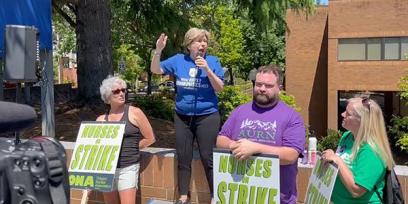In a powerful display of unity and determination, nearly 1,800 nurses and clinicians from three Providence healthcare facilities in Oregon engaged in a five-day limited duration strike to demand fair contracts that will recruit new staff, retain experienced nurses and clinicians, and honor members’ commitment to patients and their communities with safe patient-care standards, and a competitive wage and benefits package. Workers at Providence Portland, Providence Seaside and Providence Home Health and Hospice, represented by the Oregon Nurses Association, began their strike June 19.
Members of each bargaining unit have been engaged in contract negotiations with Providence management for eight months, and they are clear that Providence management has not responded to their concerns with serious proposals, which is why they decided to act, making sure their voices would be heard.
Addressing the members who attended a rally on the first day of the strike, Tamie Cline, president of the Oregon Nurses Association, acknowledged the reluctance felt by every nurse to join the picket line. It was not their first choice, but management’s disregard for their concerns had left them with no other option. “Not one of you nurses wanted to join that strike line. And not one of you nurses wanted to be here now,” Cline said. “Management has pushed you to this choice. Because everyone knows that when nurses are on the outside, there are problems on the inside.”
Cline also pointed out that the strike wasn't just about demanding respect and recognition. It was a rallying cry to protect the quality of patient care and to ensure that Providence can attract and retain exceptional nurses and providers for their communities. By standing together in solidarity, these healthcare professionals sent a clear message to their colleagues, the management and the world—that healthcare workers deserve the utmost respect and must be provided with better working conditions, competitive wages, and the support they need to serve their patients and communities.
Beyond the immediate grievances, this strike was also a protest against Providence’s unfair labor practices and a response to the gradual decline in patient care standards within the Providence healthcare system. According to ONA, what once started as a humble Catholic health system has grown into a national conglomerate with 51 hospitals that generate around $20 billion in annual revenue. It is one of the 10 largest health systems in the U.S. and the largest in Oregon.
The caregivers also rallied behind a crucial cause—ensuring stability in patient care across hospitals, home health, and hospice settings. Their proposals prioritize permanent nurses over less-experienced and costlier temporary staff and aim to improve the retention of the most qualified nurses and clinicians who continue to leave the bedside. At the core of their demands was the pressing need for adequate staffing in all care settings and an increase in paid leave hours. Providence is behind other local health system employers for total paid leave and does not have sick leave banks. ONA caregivers are also advocating for increased compensation to fill open shifts, thus providing enough nursing care for patients.
On June 22, the striking nurses and clinicians received a boost of support when AFT President Randi Weingarten joined them on the picket line at Providence Portland Medical Center. Weingarten assured them that they had the backing of every union member and stressed that a strike serves as a catalyst for change: “We take a strike action, and tell the community what's going on, so that we actually can lift up what we should be doing, which is helping every person have good health and a good life and making sure you have the resources and the support to actually do your job.”
“Our fight continues because you know what our patients need in our hospitals and care settings,” said Anne Tan Piazza, executive director of the Oregon Nurses Association, who joined Weingarten and others. Piazza underscored the need for contract language that would secure break nurses, fair compensation and benefits, all aimed at recruiting and retaining nurses and caregivers throughout the state.
Richard Botterill, an emergency department nurse and chair of the Providence Portland bargaining unit executive committee, has been heartened by the overwhelming energy, support, unity and solidarity demonstrated by the nurses and clinicians, as well as the community at large throughout the strike. “There are no words to really fully express just what an incredible, amazing family of nurses we have here at Providence Portland,” he said, noting that he hopes management is “prepared to come back to the table and bargain in good-faith reasonableness so we can provide our community with the care they deserve. That's what it's all about.”
You can sign the petition to show your support to Providence nurses and clinicians.
[Adrienne Coles]



